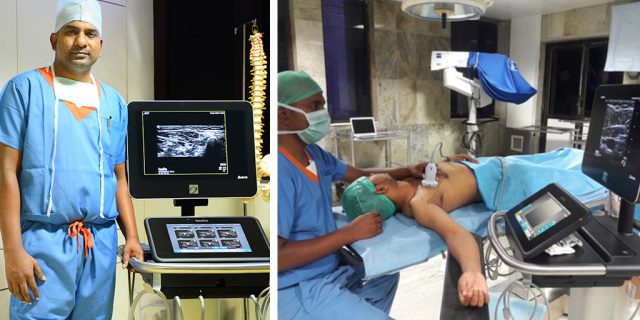
Dr. T. Sivashanmugam MD, DNB in Anaesthesiology, PDCC, FRCP is a Professor in Anaesthesiology at Mahatma Gandhi Medical College & Research Institute, a 1500-bed tertiary care teaching university hospital at Pondicherry, Tamil Nadu, India. He has more than ten years’ experience in practicing ultrasound-guided regional anaesthesia (USGRA). For the last five years, Dr. Sivashanmugam teaches and trains residents in anaesthesiology.
He initially started using Sonosite MicroMaxx ultrasound machine in 2009, and then shifted to NanoMaxx, M-Turbo, EDGE II, and eventually, X-Porte systems. Dr. Sivashanmugam explains why he remains loyal to different Sonosite machines:
"I have evolved on different generation of Sonosite systems, and they are the best fit in point-of-care scenarios, being user friendly, lightweight to facilitate easy mobility, have quick boot-up time to make timely diagnosis, and for fast decision making in critical situations."
Nowadays, Dr. Sivashanmugam seldom practises general anaesthesia for upper limb procedures. USGRA is more accurate, site specific, and more efficient with a higher success rate. With bedside USGRA, patients needing to go to the operating room for applications such as wound dressings, minimal debridement, and mobilisation of stiff joints have gone down by at least 20%.
POCUS (Point-of-care ultrasound) has proven quite beneficial in improving the efficacy of catheter placement, and has also reduced the overall cost in performing such procedures. Dr. Sivashanmugam uses POCUS for performing elbow and below-elbow bony procedures on an out-patient basis. He also extensively utilises POCUS for different head-to-toe clinical applications such as regional nerve blocks, TCD (Transcranial Doppler), ONSD (Optic Nerve Sheath Diameter), airway & lung ultrasound, focused transthoracic echo, IVC evaluation, gastric ultrasound, FAST, and diaphragm assessment in his daily practise. As Dr. Sivashanmugam notes, “Ultrasound advantages in the field of anaesthesia are seemingly endless. It seems every day, one new clinical application is added to the list!"
Dr. Sivashanmugam believes that the key challenge for training in regional anaesthesia can be overcome by the availability of POCUS systems in the Tier II and Tier III hospitals of India. POCUS systems such as Sonosite have excellent image clarity, allowing ultrasound students to observe and appreciate the “sono-anatomy” of target nerves.
Discover Sonosite X-Porte
Anaesthesiologists who utilise ultrasound guidance for needle placement see a decrease in vascular puncture and an increase in the effectiveness of pain management medication. Sonosite X-Porte's intuitive touchscreen interface allows anaesthesiologists to easily customise the user interface to suit their needs.

